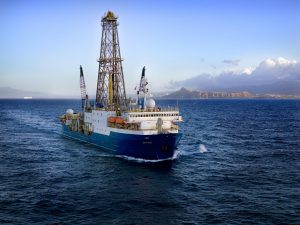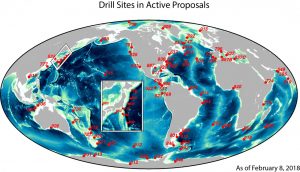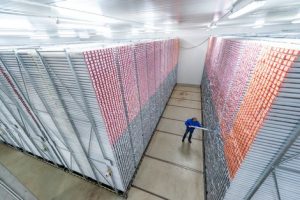After 50 years of ocean explorations, scientists continue to rely on cored material from beneath the ocean floor. The material recovered during oceanographic expeditions constitutes, in fact, a great archive where to look for answers to unravel the Earth’s system history. Over the last decades, subsequent scientific ocean drilling programs (Deep Sea Drilling Project, Ocean Drilling Program, and Integrated Ocean Drilling Program) allowed to gain precious records which have provided information about Earth’s dynamic nature including ocean circulation, climate change, ocean basin formation as well as evolution and adaptation of oceanic life forms. The integration of the dataset deriving from offshore sites with available information obtained from onshore sedimentary successions, constitutes the base for improving the Geological Time Scale and for a better understanding of the physical, chemical and biological processes controlling the formation and distribution of sediments and sedimentary rocks. For this reason, the ocean drilling is never stopping: the ongoing program “Exploring the Earth under the sea” of the International Ocean Discovery Program (IODP), continues to provide scientists with deep-time archive to be studied (http://www.iodp.org).
Joides resolution (from www.iodp.org)
The topics related to the IODP include climate and ocean change, biodiversity and origin of life, the Earth in motion, and the Earth structure and dynamics in relation with its surface environment. Following the variety of topics addressed, the oceanographic expeditions require, first, specialists of different disciplines on board. Eight IODP expeditions were conducted in 2017 for more than 60 scientists from different countries involved on board. It is, therefore, a fascinating opportunity for experts and young career scientists to participate to an expedition.
Scheduled expeditions for 2018 (from www.iodp.org)
In Europe, the European Consortium for Ocean Research Drilling (ECORD) unites 15 countries (14 European countries and Canada) and provides mission-specific platforms for IODP expeditions. Three Platform Providers conduct IODP expeditions: U.S.A. and Japan operate deep-sea drillships with the JOIDES Resolution and Chikyu respectively. ECORD is responsible for funding and implementing mission-specific platform (MSP) expeditions. Cored material is available for all scientist and there are three IODP core repositories located in Germany (IODP Bremen Core Repository), College Station, Texas (IODP Gulf Coast Repository), and Kochi, Japan. Scientists may visit any one of the facilities for onsite research or request samples for analysis purposes. Archived cores include not only IODP samples, but also those retrieved in the two older IODP legacy programs (DSDP and ODP).
IODP Bremen core repository (from www.marum.de)
If you are a scientist from ECORD member countries willing to participate to one expedition, you should check the ECORD website (http://www.ecord.org ) where open calls and related information about how to participate to an IODP expedition are provided.
Otherwise, do not miss to visit the ECORD booth at EGU 2018 this year! There will also be dedicated IODP-ICDP sessions to celebrate 50 years of successful explorations as for example EOS18 “ECORD IODP Outreach: Past, Present and Future”, US4 “Fifty years of International Ocean Drilling”, and SSP1.2. “Achievements and perspectives in scientific ocean and continental drilling” which will constitute good opportunities to acquire information on previous and new expeditions as well as to get in touch with other scientists!
So…never stop exploring!




directional drilling company adelaide
Your blog is very helpful and its so great. I was read your blog so feel awesome for your blog. Thanks for sharing such a great information..